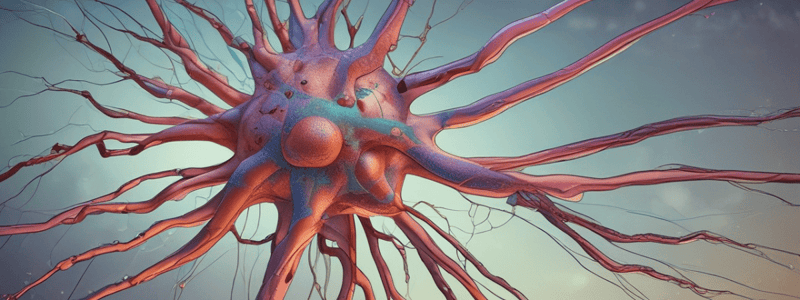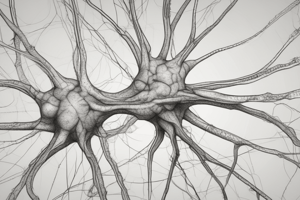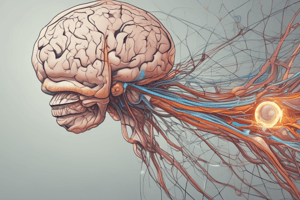Podcast
Questions and Answers
What is the effect of inhibition on the resting membrane potential?
What is the effect of inhibition on the resting membrane potential?
What is the primary mechanism that drives the membrane excitability in neurons?
What is the primary mechanism that drives the membrane excitability in neurons?
What happens to the resting membrane potential during depolarization?
What happens to the resting membrane potential during depolarization?
What is the direction of ion flow during depolarization?
What is the direction of ion flow during depolarization?
Signup and view all the answers
What is the term for the minimum amount of depolarization required to trigger an action potential?
What is the term for the minimum amount of depolarization required to trigger an action potential?
Signup and view all the answers
What is the effect of excitatory potentials on the resting membrane potential?
What is the effect of excitatory potentials on the resting membrane potential?
Signup and view all the answers
What happens to the membrane potential during depolarization?
What happens to the membrane potential during depolarization?
Signup and view all the answers
What is the duration of an action potential?
What is the duration of an action potential?
Signup and view all the answers
What is the principle that describes the generation of action potentials?
What is the principle that describes the generation of action potentials?
Signup and view all the answers
What is the term for the brief reversal of the membrane potential during an action potential?
What is the term for the brief reversal of the membrane potential during an action potential?
Signup and view all the answers
What type of ion channels are involved in the generation of action potentials?
What type of ion channels are involved in the generation of action potentials?
Signup and view all the answers
What is the term for the period when the membrane potential is more negative than usual?
What is the term for the period when the membrane potential is more negative than usual?
Signup and view all the answers
What is the zone where action potentials are initiated?
What is the zone where action potentials are initiated?
Signup and view all the answers
What is responsible for the depolarization phase of an action potential?
What is responsible for the depolarization phase of an action potential?
Signup and view all the answers
What is the change in membrane potential that leads to an action potential?
What is the change in membrane potential that leads to an action potential?
Signup and view all the answers
Who was the first to record the resting membrane potential and action potential from a living neuron?
Who was the first to record the resting membrane potential and action potential from a living neuron?
Signup and view all the answers
What is the term for the minimum amount of current density required to generate an action potential?
What is the term for the minimum amount of current density required to generate an action potential?
Signup and view all the answers
Where do action potentials propagate along the neuron?
Where do action potentials propagate along the neuron?
Signup and view all the answers
What is the primary function of the nervous system?
What is the primary function of the nervous system?
Signup and view all the answers
What is the term for the movement of ions into a neuron that causes the membrane potential to become more negative?
What is the term for the movement of ions into a neuron that causes the membrane potential to become more negative?
Signup and view all the answers
What is the minimum amount of depolarization required for an action potential to occur?
What is the minimum amount of depolarization required for an action potential to occur?
Signup and view all the answers
What is the process by which an action potential travels along the length of a neuron?
What is the process by which an action potential travels along the length of a neuron?
Signup and view all the answers
What is the term for the state of a neuron when it is not actively generating an action potential?
What is the term for the state of a neuron when it is not actively generating an action potential?
Signup and view all the answers
What is the structure responsible for generating action potentials in neurons?
What is the structure responsible for generating action potentials in neurons?
Signup and view all the answers
What is the main function of the axon terminals?
What is the main function of the axon terminals?
Signup and view all the answers
Which type of neuron has a single axon with multiple dendrites?
Which type of neuron has a single axon with multiple dendrites?
Signup and view all the answers
What is the typical resting membrane potential of a neuron?
What is the typical resting membrane potential of a neuron?
Signup and view all the answers
What is the primary means of communication between neurons?
What is the primary means of communication between neurons?
Signup and view all the answers
What is the structure that surrounds the cytoplasm of living cells and separates the intracellular components from the extracellular environment?
What is the structure that surrounds the cytoplasm of living cells and separates the intracellular components from the extracellular environment?
Signup and view all the answers
What is the term for the potential difference across a cell membrane?
What is the term for the potential difference across a cell membrane?
Signup and view all the answers
Flashcards
Resting membrane potential
Resting membrane potential
The difference in electrical charge between the inside and outside of a neuron when it is not actively transmitting a signal.
Action potential
Action potential
A rapid change in membrane potential that travels along the axon of a neuron.
Action potential propagation
Action potential propagation
The process by which an action potential is generated and transmitted along the axon of a neuron.
Polarized
Polarized
Signup and view all the flashcards
Threshold
Threshold
Signup and view all the flashcards
Depolarization
Depolarization
Signup and view all the flashcards
Hyperpolarization
Hyperpolarization
Signup and view all the flashcards
Voltage-gated channels
Voltage-gated channels
Signup and view all the flashcards
Axon hillock
Axon hillock
Signup and view all the flashcards
Inhibitory potential
Inhibitory potential
Signup and view all the flashcards
Excitatory potential
Excitatory potential
Signup and view all the flashcards
All-or-none principle
All-or-none principle
Signup and view all the flashcards
Refractory period
Refractory period
Signup and view all the flashcards
Overshoot
Overshoot
Signup and view all the flashcards
Synaptic receptors
Synaptic receptors
Signup and view all the flashcards
Synapse
Synapse
Signup and view all the flashcards
Neurotransmitter
Neurotransmitter
Signup and view all the flashcards
Neurotransmitter release and binding
Neurotransmitter release and binding
Signup and view all the flashcards
Neurotransmitter reuptake
Neurotransmitter reuptake
Signup and view all the flashcards
Sensory neurons
Sensory neurons
Signup and view all the flashcards
Motor neurons
Motor neurons
Signup and view all the flashcards
Interneurons
Interneurons
Signup and view all the flashcards
Dendrites
Dendrites
Signup and view all the flashcards
Axon
Axon
Signup and view all the flashcards
Myelin
Myelin
Signup and view all the flashcards
Nodes of Ranvier
Nodes of Ranvier
Signup and view all the flashcards
Information processing
Information processing
Signup and view all the flashcards
Neuroplasticity
Neuroplasticity
Signup and view all the flashcards




